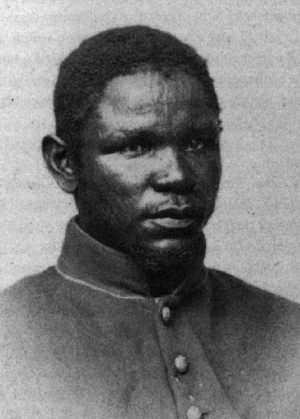Nicholas Said facts for kids
Quick facts for kids
Nicholas Said
|
|
|---|---|
 |
|
| Born | 1836 Kukawa, Bornu Empire |
| Died | 1882 (aged 45–46) Brownsville, Tennessee, United States of America |
| Allegiance | United States of America Union |
| Service/ |
United States Army Union Army |
| Years of service | 1863–1865 |
| Rank | Sergeant |
| Unit | 55th Massachusetts Volunteer Infantry |
| Battles/wars | American Civil War |
Nicholas Said (born Muhammed 'Ali Sa'id, 1836–1882) was an amazing person who traveled the world, spoke many languages, served as a soldier, and wrote his own life story. He was born in Africa and lived an incredible life full of adventure and learning.
Contents
Nicholas Said's Early Life and Travels
Nicholas Said was born in 1836 in a place called Kukawa, which was part of the Bornu Empire in Africa. When he was young, he was captured and taken from his home. However, because his father was a famous general and Nicholas was very good at learning languages, his situation improved.
A Gift for Languages
Nicholas quickly learned Arabic when he was young. After being captured, he learned Ottoman Turkish, the language of his captors. His amazing talent for languages was noticed by a Russian prince named Alexander Sergeyevich Menshikov. The prince saw that Nicholas was very smart and even hired a French tutor for him!
By the time he wrote his memoirs in 1872, Nicholas knew or was fluent in many languages. These included Kanuri, Mandara, Arabic, Turkish, Russian, German, Italian, and French languages. He even knew some Armenian.
Traveling the World
Nicholas Said traveled to many different parts of the world. He explored Africa, the Middle East, Europe, and the Russian Empire. Later, he also visited the Caribbean, South America, Canada, and the United States. In his writings, he spoke about how he felt about the attacks on his homeland by Usman dan Fodio. He also wrote about his special trip to Mecca and a surprising meeting with the Tsar (the emperor of Russia). He also shared how he changed from following Islam to Christianity while in a city called Riga.
Serving in the American Civil War
From 1863 to 1865, Nicholas Said joined the Union Army during the American Civil War. This was a big war in the United States. What's interesting is that Nicholas was different from most African Americans who fought in this war. He and his family had never been enslaved in the United States. Instead, Nicholas chose to move to the U.S. and then volunteered to fight for the Union.
Near the end of the war, he asked to work in the Hospital Department. He wanted to study medicine and learn how to help people. After the war, a journalist wrote in 1867 that Nicholas fell in love with an American woman and they got married. They reportedly settled in St. Stephens, Alabama, where Nicholas wrote his life story. We don't know much about his later years, but one story says he passed away in Brownsville, Tennessee.
A Hidden Past
Nicholas lived in the Reconstruction-era South after the war. This was a difficult time for African Americans. Because of this, he didn't mention his service in the United States Army in his memoirs. However, a special photograph of Nicholas exists. It shows him proudly wearing his U.S. Army uniform from his time with the 55th United States Colored Infantry Regiment.
Nicholas Said's Family in Bornu
Nicholas Said said he was a Kanouri speaker born in "Kouka" (now Kukawa), near Lake Chad. His father was a famous general named Katzalla Barca Gana, and his mother was a Mandara woman named Dalia. Nicholas was mostly raised by his mother.
He described his father as a very large, tall, and strong man, "resembling more a giant than an ordinary man." Nicholas said his father was a hero who fought bravely for their country. He was known as "the terror of... the enemies of our Country, and wherever he appeared the enemy fled..."
His Father's Bravery
An English traveler named Dixon Denham actually saw Nicholas's father, Barca Gana, in battle. Denham wrote about a fight where Barca Gana's soldiers joined with others against the Sokoto Caliphate. Denham reported that Barca Gana was incredibly strong. He once threw a spear from far away and took down an enemy warrior. Denham also said that three horses were killed under Barca Gana during the battle, showing how fierce the fighting was.
Nicholas Said was born years after this battle. He also wrote about his first time seeing a white man. He identified him as the German researcher Heinrich Barth: "When I was about twelve years old, a large caravan arrived from Fezzan, and it was said a Sârâ (white man) was one of the party. This raised a great excitement, particularly among us children, for we had heard fabulous tales concerning them. Sure enough, there arrived a white man, and the King assigned him a dwelling situated in East Kouka... The first time I saw him was one day when he was in the market, outside of Kouka, and I ran from him."
 | Calvin Brent |
 | Walter T. Bailey |
 | Martha Cassell Thompson |
 | Alberta Jeannette Cassell |

